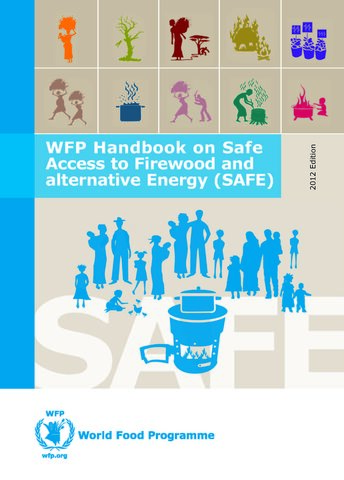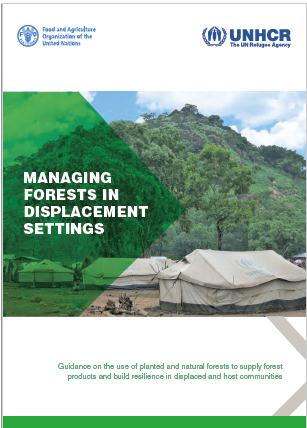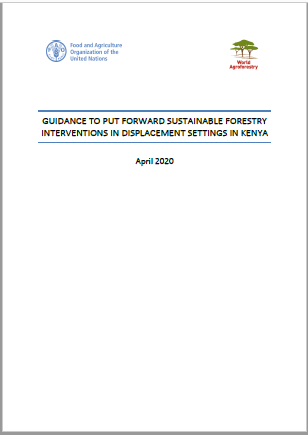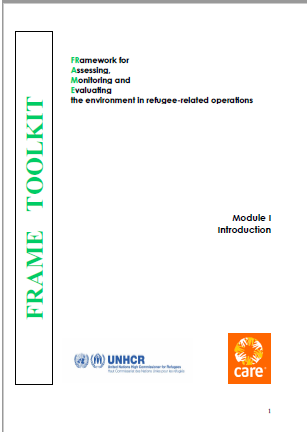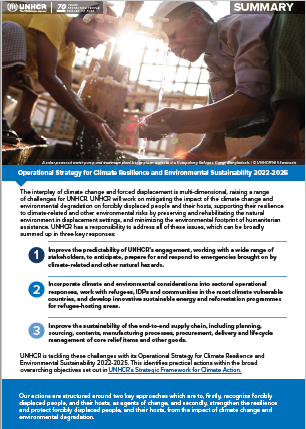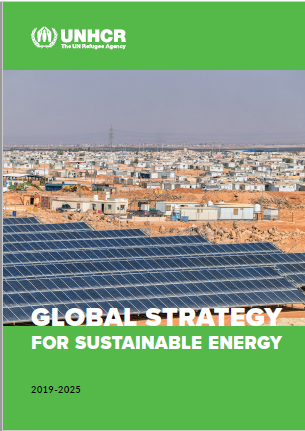An integrated approach entails working across sectors, geographic and socioeconomic boundaries, and addressing longer-term objectives and needs. It builds on good understanding of stakeholder perceptions and the principle of effective “participation and stakeholder engagement”, involving both refugees and host communities.
Engage and facilitate stakeholders to develop a common vision for social, environmental and economic transformation in a particular landscape
- Target preferred social outcomes through a process of co-design and inclusive participatory approaches prioritizing basic needs and priorities as identified through needs assessments.
- Envision landscape-level environmental sustainability and resilience, following mapping assessments of ecosystem carrying capacity, environmental risks and land-use planning.
- Address economic outcomes to promote self-reliance and sustainable livelihoods, following analyses of economic activities, availability of credit mechanisms, market systems and value chains.
Develop a theory of change based on the vision developed
- Describe a pathway of change towards the vision.
Identify and prioritize livelihood and environmental management interventions
- Ensure the voices of men, women, youth and other vulnerable groups are heard, and their diverse priorities and preferences are represented in the final interventions/programme.
Develop a plan with short-term and long-term objectives
- Clearly define roles, responsibilities and resources of multiple actors across disciplines and sectors.
- Implement interventions collaboratively with periodic engagement for planning and learning on multistakeholder platforms.
Resource recovery and reuse (RRR) approaches in Kakuma refugee camp, Kalobeyei Integrated Settlement and host communities
RRR is an approach being implemented between 2019 and 2023 in six refugee camps and settlements and their surrounding host communities in Ethiopia, Kenya and Uganda. The aim of the project is to increase the resilience of these communities through the implementation of gender responsive RRR solutions while building an evidence base. This work builds on previous research and innovations by project partners in developing, testing and verifying technologies and livelihood models for gender responsive, circular bio-economy solutions to capture energy, water and nutrients, and building resilient food and energy systems for refugee settlements and their host communities. The project targets 3,600 direct and 200,000 indirect beneficiaries with one-third of this target in the Kakuma-Kalobeyei landscape. Extensive uptake of project training indicates the success of this project’s definition of scale as having many participants rather than measuring success via the area cultivated or kilograms of vegetables produced.
This work is a collaboration between ICRAF, IWMI, Pennsylvania State University, CIAT, DRC, UN-HABITAT and UNHCR. It is supported by the German Federal Ministry for Economic Cooperation and Development (BMZ) commissioned by Deutsche Gesellschaft für Internationale Zusammenarbeit (GIZ) through the Fund International Agricultural Research (FIA) and Ag Sciences Global, College of Agricultural Sciences, Pennsylvania State University, USA through funding from the United States Department of Agriculture – National Institute of Food and Agriculture (USDA-NIFA), and Hatch Appropriations of the United States Government under Project #PEN04724 and Accession #1020895 (Adam-Bradford et al. 2022).
Sources:
Gambo J, Njenga M, Sola P, Duba D, Waruingi E, Awono A, Buyinza J, Schure J. 2022. Guidance for a Landscape Approach in Displacement Settings (GLADS): Kenya Case Study. CIFOR-ICRAF: Bogor, Indonesia; Nairobi.Adam-Bradford A, Mendum R, Njenga M, Woldetsadik D, Acanakwo EF, Gebrezgabher S. 2022. Circular bio-economy innovations for resilient refugee and host communities in East Africa. Colombo, Sri Lanka: International Water Management Institute (IWMI). 12p. Resource Recovery and Reuse (RRR) in Refugee Settlements in Africa: Project Brief Series 3.





